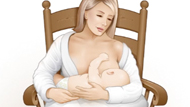Stopping Breastfeeding Suddenly
Topic Overview
If you stop breastfeeding suddenly, your breasts may become full and sore and may leak milk. This is called breast engorgement. Many women have only mild symptoms that can be treated at home. But it can lead to more serious problems.
What can you do to help prevent engorgement?
It's best to stop breastfeeding gradually, if you can. If you have to stop breastfeeding suddenly, you can use a breast pump to remove the milk and slowly reduce your milk supply. A lactation consultant or other breastfeeding expert can help you choose a breast pump and teach you how to use it.
To help prevent engorgement:
- Drop one pumping session every 2 to 3 days. For example, if you start out pumping 6 times a day, switch to 5 times a day, and space the sessions farther apart. Then in a couple of days, drop to 4 sessions. It may take 1 to 4 weeks to stop.
- In each session, remove just enough milk to make you more comfortable. Emptying your breasts will cause you to make more milk.
At present, there is no approved medicine that will reduce your milk supply and prevent engorgement.
What can you do if you have breast engorgement?
Many women have only mild symptoms that can be treated at home. If your breasts become engorged, use one or more of the following methods:
- Use cold compresses to help reduce swelling. Place the compress on your breasts for 15 minutes at a time every hour as needed. You can use cold gel or ice packs, a frozen wet towel, or bags of frozen vegetables. To prevent damage to your skin, put a thin cloth between the cold compress and your breast.
- Wear a supportive bra that fits well.
- In addition to the non-medicine treatments, take ibuprofen (such as Advil or Motrin) to help reduce swelling and pain. Be safe with medicines. Read and follow all instructions on the label.
Breast engorgement will go away as your breasts stop making milk. Pain and discomfort should go away in 1 to 5 days.
In some cases, breast engorgement may become severe, which can lead to a blocked milk duct or breast infection. For more information, see the topic Breast Engorgement.
Other Places To Get Help
Organizations
Related Information
Credits
ByHealthwise Staff
Primary Medical Reviewer Sarah Marshall, MD - Family Medicine
Kathleen Romito, MD - Family Medicine
Adam Husney, MD - Family Medicine
Specialist Medical Reviewer Kirtly Jones, MD - Obstetrics and Gynecology
Current as ofNovember 21, 2017
- Top of Page
Next Section:
Other Places To Get Help
Previous Section:
Topic Overview- Top of Page
Next Section:
Related Information
Previous Section:
Other Places To Get Help- Top of Page
Next Section:
Credits
Previous Section:
Related Information- Top of Page
Current as of: November 21, 2017




